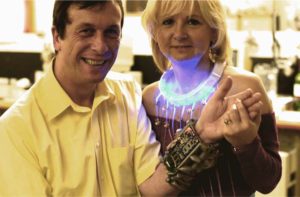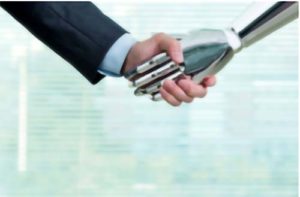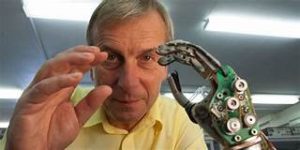
Kevin’s lecture took me by surprise.
A guest lecturer at the New York Post Human series a few years ago blew my mind. He is the first human cyborg and his name is Kevin Warwick. It was fascinating listening to someone who is a living, physical manifestation of his technological genius. As I sat there in my seat transfixed, I heard him recount that he had a chip in his arm connected to his nerves. While connected to wifi he is able to turn lights on and off, open and close doors, turn on his computer and click on his mail icon and check his email just by thinking about it. It was a one of the weirdest and most fascinating lectures I have ever attended. He spoke calmly about his capabilities as we all watched him on skype from his office in England. If you judged this book by the cover you would have noticed a mild mannered man who looked fairly average with no hint at what lay beneath the surface.
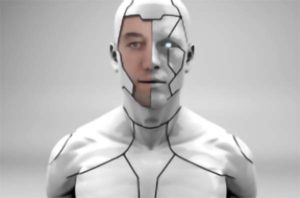
What is a cyborg?
The term cyborg is short for cybernetic organism. It is any living being that has both organic and mechanical electrical parts that either restore or enhance someone to continue functioning. Robots don’t fall under this category. People with prosthetic limbs, pacemakers, cochlear (ear) implants or organ recipients from artificially cultured stem cells are also considered cyborgs.
How did this happen and when?
In 2002 he was implanted with an electrode array in the nerve fibers in his arm, the ends of which were connected to a computer. Through this he succeeded in controlling the hand of a robot in the U.K. from Columbia University in New York using the internet. During the experiment Kevin felt feedback from the arm such as pressure and force which is totally unique to this technology. If designed for amputees by connecting to nerve clusters at the end of a still healthy area, all they would have to do is think of moving their new limb and it would happen.
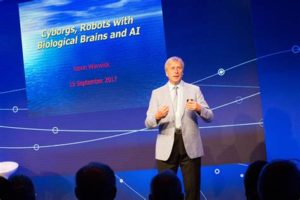
What’s Kevin’s background?
Kevin Warwick is an English engineer and deputy Vice Chancellor of research at Coventry University in the U.K. He performs research in artificial intelligence, biomedical engineering, control systems and robotics. He has a PHD in engineering and research from Imperial College in London and lectures extensively internationally to teach others about this technology and it’s future uses for humanity. He’s considered a maverick in the fields of bio-engineering, robotics and an extraordinary, creative, pioneer and researcher.
Why did he do this to himself?
Warwick is concerned about the future of mankind and it’s ability to compete with artificial intelligence. He believes that humanity will need to use technology to enhance ourselves to avoid being taken over by machines. Kevin,”We are all limited by our senses and would easily be outperformed by machines.” He’s excited to gain these new abilities to become more than human and is now considered a trans-human, due to his new technological abilities and enhancements. One of his major influences is the movie, The Terminator. It’s not his goal to become a robot. He just wants to become a better human. Kevin,”Someday we’ll switch on that machine, and we won’t be able to switch it off.” That may explain why he chooses not to have that much tech at at his home.
How his wife, Irena got involved.
Irena, his wife had a more simplified sensor connected to her arm and was able to feel impulses from Kevin. During the lecture Kevin also describes an experiment in which Irena wore a specially designed necklace so she was able to sense how he was feeling, while he was traveling in another country to lecture. With the necklace enhanced with sensor technology connected to his silicone chips, she could sense when he was happy, sad or excited. It would change colors or vibrate to match his ever changing moods.
The future of this technology and it’s applications.
This technology can give hope to amputees to live a more full, normal and independent life by regaining the use of lost limbs. Also, just think of the possibilities, if you could clone yourself in the future wouldn’t it be wonderful to have the capability to train a separate self to complete chores or tasks at home, while you are still at work? In addition, by connecting to another person in the future there may be an opportunity for us to join a controlled, limited collective consciousness which would allow people to feel more empathy towards others and the rest of humanity.
Will it become the norm?
Over time what seems unusual or freaky presently, may become the norm. If an earlier version of the human race met us now with our contact lenses, glasses, pacemakers, cars, airplanes, mobile phones, computers and current technology, they would think that we were aliens or at the very least magic. Progress can’t be stopped and if given the chance to walk again or continue to live an independent life, I’m sure that people will eventually embrace technological progress if it benefits them and gives them a longer and higher quality of life.
